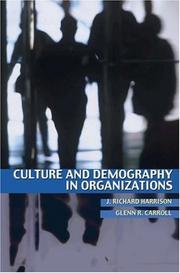| Listing 1 - 1 of 1 |
Sort by
|

ISBN: 0691124825 9780691124827 0691124817 9780691124810 Year: 2006 Publisher: Princeton, New Jersey ; Oxford : Princeton University Press,
Abstract | Keywords | Export | Availability | Bookmark
 Loading...
Loading...Choose an application
- Reference Manager
- EndNote
- RefWorks (Direct export to RefWorks)
How do corporations and other organizations maintain and transmit their cultures over time? Culture and Demography in Organizations offers the most reliable and comprehensive answer to this complex question to date. The first book on the subject to ground its analysis in mathematical tools and computer simulation, it goes beyond standard approaches, which focus on socialization within organizations, by explicitly considering the effects of demographic processes of entry, exit, and organizational growth. J. Richard Harrison and Glenn R. Carroll base their analysis on a formal model with three components: hiring, socialization, and employee turnover. In exploring the model's implications through computer simulation methods, the authors cover topics such as organizational growth and decline, top management teams, organizational influence networks, terrorist organizations, cultural integration following mergers, and organizational failure. For each topic, they identify the conditions influencing cultural transmission. In general, they find that demographic processes play a central role in influencing organizational culture and that studying these processes leads to some surprising insights unavailable when considering socialization alone. This book, which also serves as an ideal introduction to the increasingly popular use of computer simulation, will be an indispensable resource for scholars and students of organization theory and behavior, cultural studies, strategic management, sociology, economics, and social simulation.
Organization theory --- Corporate culture. --- Employees --- Labor turnover. --- Organizational change. --- Social sciences --- Strategic planning. --- Recruiting. --- Computer simulation. --- Corporate culture --- Labor turnover --- Organizational change --- Strategic planning --- Goal setting (Strategic planning) --- Planning, Strategic --- Strategic intent (Strategic planning) --- Strategic management --- Planning --- Business planning --- Behavioral sciences --- Human sciences --- Sciences, Social --- Social science --- Social studies --- Civilization --- Change, Organizational --- Organization development --- Organizational development --- Organizational innovation --- Management --- Organization --- Manpower planning --- Employee turnover --- Turnover of labor --- Personnel management --- Labor mobility --- Recruiting of employees --- Recruitment of employees --- Employment agencies --- Culture, Corporate --- Institutional culture --- Organizational culture --- Corporations --- Organizational behavior --- Business anthropology --- Recruiting --- Computer simulation --- Sociological aspects --- SOCIAL SCIENCE / Sociology / General. --- Demografische aspecten. --- Bedrijfscultuur. --- Organisationskultur --- Unternehmenskultur --- 85.08 organizational sociology and psychology. --- Sciences sociales --- Personnel --- Foires à l'emploi. --- Planification strategique. --- Changement organisationnel. --- Culture d'entreprise. --- Laborers --- Workers --- Persons --- Industrial relations --- Simulation par ordinateur. --- Rotation. --- Cypress Semiconductor. --- Gibrat's law. --- Grooves. --- Hewlett-Packard. --- Japanese-style organizational type Jesuits. --- New Guinea. --- Q-sort technique. --- Southwest Airlines. --- Texas Instruments. --- Weather Underground. --- Z-type organizational type. --- assumptions of model. --- autocratic model. --- board of directors. --- bureaucratic organizational type. --- cellular structure. --- cultural analysis. --- decomposition of tenure distribution. --- design. --- dimensions of culture. --- disruption effect. --- entrepreneurial organization. --- epidemiology of representations. --- ethnography. --- explanation. --- fraternities. --- heterogeneity. --- homogeneity. --- influence network. --- liability of newness. --- measurement of culture. --- mortality. --- multidimensionality in culture. --- peer influence. --- psychological anthropology. --- recruitment. --- sensitivity analysis. --- socialization. --- star model. --- stochastic rate tekonymy. --- strong culture. --- structural holes. --- subcultures. --- tenure. --- terrorist organizations. --- tractability of model. --- turnover. --- underground organizations. --- utility concept. --- values. --- variance in enculturation.
| Listing 1 - 1 of 1 |
Sort by
|

 Search
Search Feedback
Feedback About UniCat
About UniCat  Help
Help News
News